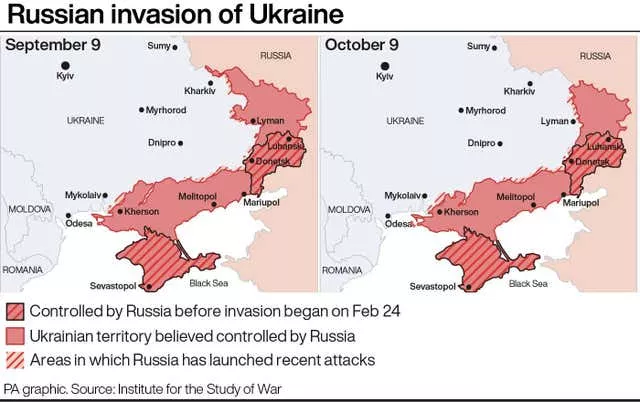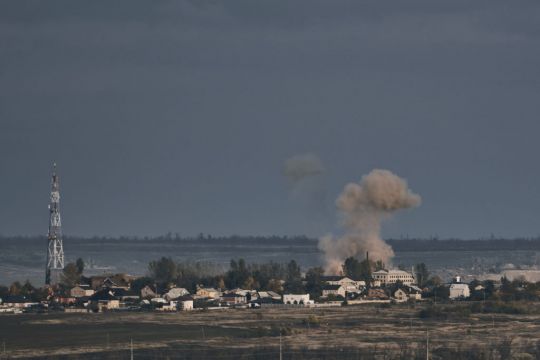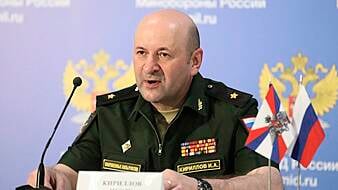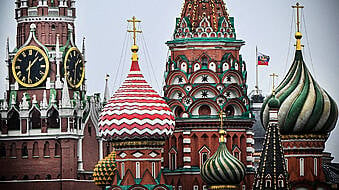Russia’s military leadership has withdrawn its officers in the Russian-annexed city of Kherson across the Dnieper River in anticipation of an advance by Ukrainian troops, a think tank has said.
To delay the Ukrainian counter-offensive as the Russians complete their retreat, Moscow has left newly mobilised, inexperienced forces on the other side of the wide river, the Institute for the Study of War (ISW) added.
The troop movements come as the Ukrainian military said its forces have continued their counter-offensives in the Kherson and Zaporizhzhia regions.

On Saturday, Russian-installed authorities in Ukraine told all Kherson residents to leave immediately ahead of the expected action by Ukrainian troops to take back the city.
Kirill Stremousov, deputy head of the Russian-backed regional administration in Kherson, said on Sunday that more than 20,000 civilians had evacuated to the left bank of the Dnieper River.
He said that while Ukrainian forces were trying to push their offensive on the right bank, Russian defensive lines “have been reinforced and the situation has remained stable”.
Kherson has been in Russian hands since the early days of the eight-month war in Ukraine. The city is the capital of a region of the same name, one of four that Russian President Vladimir Putin illegally annexed last month and put under Russian martial law on Thursday.
On Friday, Ukrainian forces bombarded Russian positions across the province, targeting pro-Kremlin forces’ resupply routes across the Dnieper River and preparing for a final push to reclaim the city.
The ISW think tank also said that Russia’s latest war strategy of targeting power plants in recent days appears to be aimed at diminishing Ukrainians’ will to fight and forcing Ukraine’s government to spend additional resources to protect civilians and energy infrastructure.
It said the effort was unlikely to damage Ukrainian morale but would have a significant economic impact.
The Russian attacks on power supplies forced the emergency suspension of fertiliser production at a major chemical plant, Rivneazot, in north-western Ukraine. The company said on Sunday the suspension is not posing an environmental risk.
The mayor of Enerhodar, home to the Zaporizhzhia nuclear plant, reported an attack on a hotel used by Russian occupying forces and those who collaborate with them. It was unclear if anyone was hurt.
The Ukrainian military said on Sunday that Russian forces are now mostly on the defensive but are keeping up offensive attacks on Ukraine’s energy infrastructure and on several towns in the eastern Donbas area.

Nine regions across Ukraine, from Odesa in the south west to Kharkiv in the north east, saw attacks again targeting energy and other critical infrastructure over the past day, the Ukrainian general staff said.
It reported a total of 25 Russian air strikes and more than 100 missile and artillery strikes around Ukraine.
Ukrainian counter-offensive forces in the Kherson and Zaporizhzhia regions targeted Russian-held facilities, notably in the town of Nova Kakhovka, and carried out 17 air strikes in the overall campaign, according to the Ukrainian general staff.
In a Telegram post on Sunday, the Ukrainian military claimed to have destroyed 14 Iranian-made Russian drones over the past day.
Russian S-300 missile strikes overnight hit a residential neighbourhood in the city of Mykolaiv, injuring three people, according to the Ukrainian military’s southern command.
Two apartment buildings, a playground and a warehouse were damaged or destroyed, it said in a Facebook post.
Images posted on Telegram by local media and officials showed an apartment building with one side sheared off, and piles of rubble amid puddles on the adjacent ground.
Governors of two Russian regions that border north-eastern Ukraine said defensive lines are being built, apparently in anticipation of cross-border attacks as Ukrainian troops advance.
Kursk governor Roman Starovoit said on Sunday that two defensive lines in the region already have been built and a third one will be finished by November 5.
Belgorod governor Vyacheslav Gladkov said that defensive lines were also built in his region. On Saturday, he posted pictures of lines of pyramid-shaped concrete blocks intended to block the movement of armoured vehicles.
Elsewhere, Ukraine’s security service said it has detained the long-time chief of a major aircraft engine factory, accusing him of collaborating with Russia by supplying military equipment for Russian attack aircraft.

Viacheslav Bohuslaiev, president of the Motor Sich plant in Zaporizhzhia, and another top factory official were charged with collaboration and “assisting the aggressor state”.
The Ukrainian security service SBU said that the two are accused of colluding with a Russian arms maker close to the Kremlin to supply Ukrainian-made engines and spare parts to Russian forces.
The SBU described a complex scheme using intermediaries in three countries to evade sanctions against Russia.
Motor Sich is one of Ukraine’s leading manufacturers and has been a key maker of aircraft engines since Soviet times. Its facilities have been repeatedly targeted by Russian strikes during the war.







